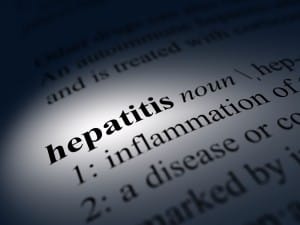New findings from a team of French researchers point to a substantial increase in alcoholic hepatitis risks in alcohol-dependent people with severe vitamin D deficiencies. Significant numbers of people who routinely consume excessive amounts of alcohol will develop alcoholic hepatitis, one of three interrelated conditions jointly known as alcoholic liver disease. In a study published in May 2015 in the journal Alcoholism: Clinical & Experimental Research, researchers from three French institutions assessed the impact that a serious vitamin D deficiency has on the alcoholic hepatitis risks of any person affected by diagnosable alcohol dependence (i.e., alcoholism). These researchers identified major vitamin D deficiency in the target population group as a unique alcoholic hepatitis risk factor.
Alcoholic Hepatitis
Whenever the term hepatitis is used, it refers to the same basic condition: inflammation in the liver, the body’s primary organ for toxin processing and (along with the kidneys) elimination. In people who habitually consume excessive amounts of alcohol, this liver inflammation is commonly known as alcoholic hepatitis (although a heavy drinker may also have hepatitis triggered by other habits or health problems). Alcoholic hepatitis occurs when the level of alcohol consumed repeatedly overwhelms the liver’s processing capacity and subsequently leads to swelling in liver tissues. Some people with the condition experience a substantial rebound in liver health if they quit drinking. However, others have a chronic form of hepatitis that can eventually result in severe or fatal changes in liver function. The American Liver Association estimates that roughly one-third of the nation’s heavy drinkers have alcoholic hepatitis. Alcoholic hepatitis overlaps significantly with another form of alcoholic liver disease called alcoholic fatty liver disease, which affects large numbers of habitual excessive drinkers. The main problem in people with alcoholic fatty liver disease is an alcohol-induced accumulation of fat inside the liver’s cells. Unlike alcoholic hepatitis—which produces clear symptoms that can include fever, belly pain and jaundice—alcoholic fatty liver disease typically produces no symptoms directly detectible by the individual. Since all people with alcoholic hepatitis have an abnormal fat buildup in their liver cells, experts sometimes refer to the condition as alcoholic steatohepatitis. (The “steato-” indicates fat-related liver inflammation.)
Vitamin D Deficiency
The human body relies on vitamin D for functions that include the facilitation of bone growth and repair, proper digestion of certain nutrients, normal kidney function and production of the blood sugar-controlling hormone insulin. However, before the vitamin can perform any of these tasks, it must undergo a chemical conversion inside of the liver. You can develop a vitamin D deficiency if you don’t get enough of the vitamin through dietary sources or sunlight exposure, have problems absorbing the vitamin D content in your food, don’t respond normally to effects of the vitamin or have problems with vitamin D processing in your liver or kidneys. Deficiencies of vitamin D are relatively common in the general population in the U.S. and the rest of the world.
Impact on Alcoholic Hepatitis Risks
In the study published in Alcoholism: Clinical & Experimental Research, researchers from the French Institute of Health and Medical Research and two branches of the University of Nice used a project involving 101 adults to explore the potential impact of a vitamin D deficiency on the odds that any given person with alcoholism will develop alcoholic hepatitis. All of the participants were affected by alcoholism. Each individual had his or her liver health checked through a tissue-sampling procedure called a biopsy. The researchers used blood testing to perform an advanced analysis of each participant’s vitamin D levels. The researchers found that 40.6 percent of the 101 study participants had diagnosable symptoms of alcoholic hepatitis. (Thirty percent of the participants had another potentially alcohol-related liver condition called bridging fibrosis.) In addition, they found that 60.4 percent of study participants had indications of a severe form of vitamin D deficiency. When they compared the alcoholic hepatitis subgroup to the severe vitamin D deficiency subgroup, the researchers concluded that fully 85.4 percent of those individuals with alcoholic hepatitis also had a severe lack of vitamin D. All told, they calculated that alcohol-dependent people with severely low levels of the vitamin experience more than an eightfold increase in their alcoholic hepatitis risks. The researchers specifically identified extreme vitamin D deficiency as a separate and distinct predictor for the onset of alcoholic hepatitis in individuals with alcoholism.




